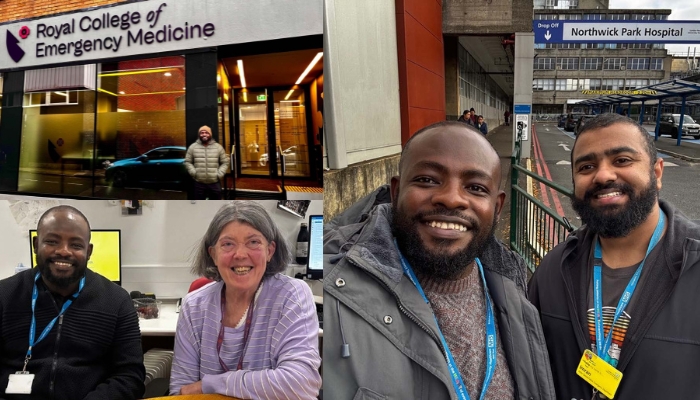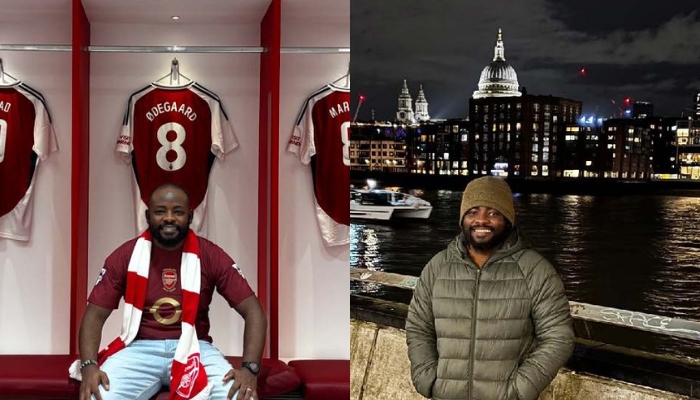27 March 2025
Dr Kevin Nyachieo Ochari, the first Kenyan to participate in the Global Observer Fellowship scheme by the Royal College of Emergency Medicine (RCEM), shares his vision for EM growth in Kenya after travelling to London to see Emergency Medicine (EM) being practised in the NHS.

I arrived in London on a chilly Monday morning. It was ten degrees outside, something I had never experienced before in the warm tropics of Nairobi, Kenya. Zero degrees or 50 degrees, no weather was going to spoil my mood or deter my experience in the UK for the next month.
Preparation and Support
A lot of prep work had gone into me getting to the UK. Numerous email threads, calls, and WhatsApp messages had been exchanged with the RCEM International team to make this possible, who were supportive from the moment I got my email confirmation to when I landed at Heathrow on the 11 November 2024 and throughout the month of the fellowship.
Settling In
Dr Gillian Park at Northwick Park Hospital was going to be my host for the duration of the fellowship. She had reached out to me a few days before my trip and organised a taxi pick-up from Heathrow to my designated accommodation. We shared a cup of tea and some biscuits when I arrived at her office in Northwick Park, and almost every day since during our catch-up sessions. She helped me settle into my accommodation, introduced me to the team at Northwick Park, and was keen to always make sure I was comfortable. She also created my daily schedule of training and clinical rounds. Despite being thousands of miles from Kenya, she made me feel at home every day.
Training and clinical rounds
After a day of rest and settling in, I immediately set off with the fellowship by attending Leading through Education to Excellent Patient Care (LEEP) courses offered at Northwick Park. This was one of the highlights of the program as I got to interact with like-minded colleagues from various specialties, training programs, and years of training. Throughout the week, I joined clinical rounds in A&E and interacted with the very friendly staff at Northwick Park.
Experiences at different hospitals
The following weeks were primarily spent doing clinical rounds and training programs at Northwick Park, Hammersmith, and Chelsea & Westminster Hospitals. My time at Chelsea & Westminster was very productive, especially because of the role Dr Shweta Gidwani played in taking time off her schedule to teach and mentor me during my time in central London. She shared valuable insights on EM Training and practice within the NHS. It is no wonder that in EM circles globally she is very revered.

Exploring the UK
Outside the clinical realm, I got to travel around and sightsee in London and even to other towns in the UK on my off days. This was very enjoyable and made for a good balance of activities during the four weeks I was there. A visit to the RCEM offices during my last week crowned it all. RCEM International took me for a night tour of London which culminated with a nice dinner.
Reflections on the fellowship
The fellowship was worthwhile and has played a very important role in shaping my views on EM and provided an impetus to champion its growth in Kenya where no formal EM training program exists. I am thankful to RCEM for the opportunity, expect more from me and Kenya.
The key takeaways from my Observership include the importance of protocols and guidelines. I am trying to implement these through the Emergency Medicine Kenya Foundation (EMKF), an NGO that supports emergency healthcare services in Kenya through capacity building, knowledge development, advocacy, and research. Currently, there is no standardisation of care across different facilities in Kenya, and in private hospitals, money is often a factor.
New practices, systems, or procedures that could be implemented in Kenya based on my experience include protocols for mass haemorrhage, trauma calls, acute respiratory distress, fever in a child, and acute chest pain. EM training in the UK is quite long, but I believe three to four years should be sufficient. The interaction between trainees and faculty in the UK is excellent, with one-to-one learning always encouraged. There are good working relationships between consultants and trainees, whereas in Kenya, it’s more hierarchical.
In the UK, not all training is done in one hospital; trainees rotate. In Kenya, Masters students are often in one hospital for four to five years unless they have an elective programme. Training should be decentralised to better prepare trainees who are posted in rural areas after training in the capital.
Advice for future observers
When you arrive, have an open mind, be ready to learn and travel. The first few days I was quite anxious but made the most of the opportunity by asking for what I really wanted from the Observership and keeping focused on what I hoped to gain – personally and clinically. Don’t be afraid to ask questions! And walk when you can to see the incredible city of London!
